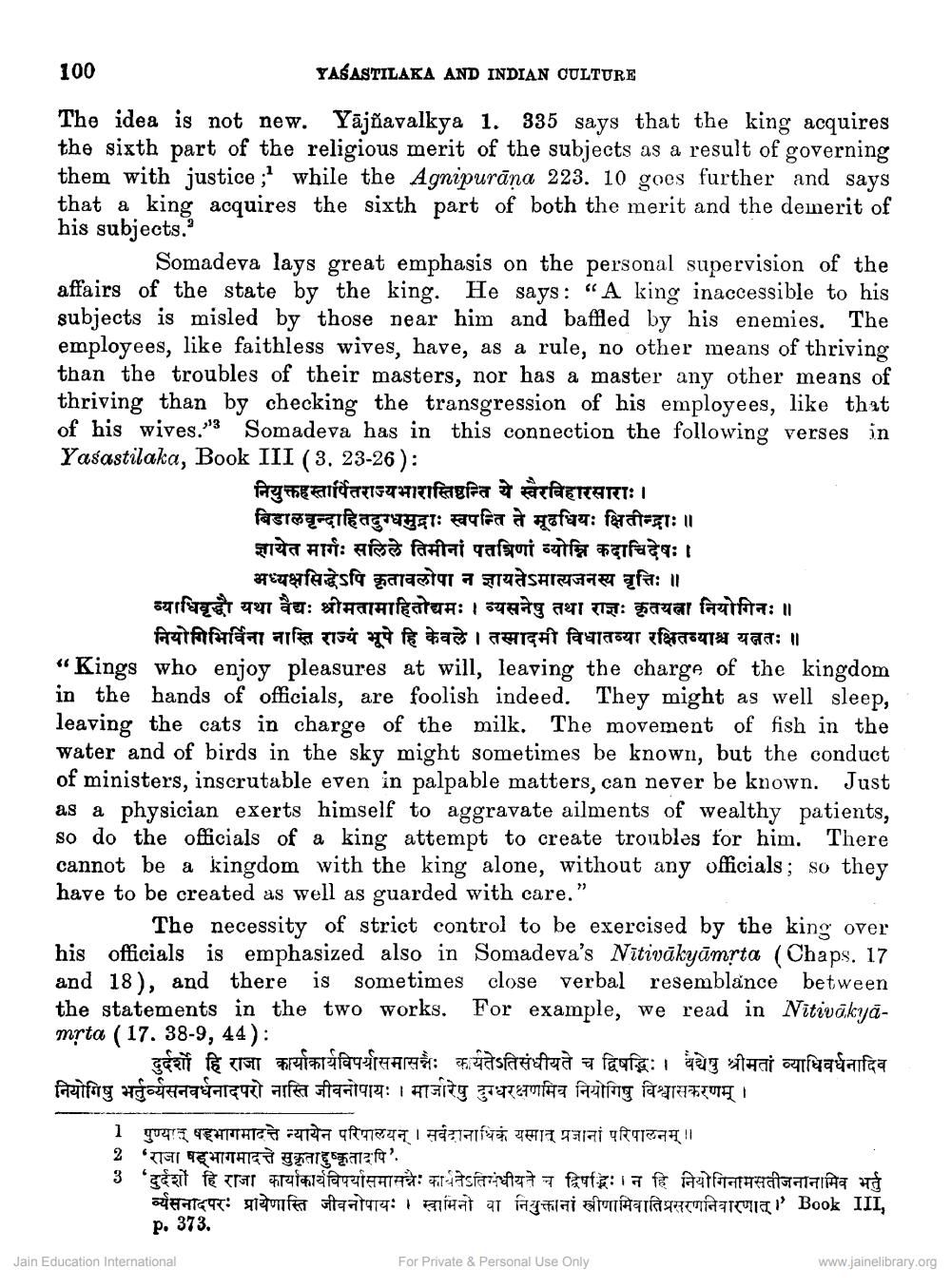________________
100
YASASTILAKA AND INDIAN CULTURE
The idea is not new. Yajnavalkya 1. 335 says that the king acquires the sixth part of the religious merit of the subjects as a result of governing them with justice ; while the Agnipurāna 223. 10 goes further and says king acquires the sixth part of both the merit and the demerit of his subjects.'
that a
Somadeva lays great emphasis on the personal supervision of the affairs of the state by the king. He says: "A king inaccessible to his subjects is misled by those near him and baffled by his enemies. The employees, like faithless wives, have, as a rule, no other means of thriving than the troubles of their masters, nor has a master any other means of thriving than by checking the transgression of his employees, like that of his wives."3 Somadeva has in this connection the following verses in Yasastilaka, Book III (3. 23-26):
नियुक्तहस्तापित राज्यभारास्तिष्ठन्ति ये स्वैरविहारसाराः । बिडालवृन्दा हि तदुग्धमुद्राः स्वपन्ति ते मूढधियः क्षितीन्द्राः ॥ ज्ञायेत मार्गः सलिले तिमीनां पतत्रिणां व्योम्नि कदाचिदेषः । अध्यक्षसिद्धेऽपि कृतावलोपा न ज्ञायतेऽमात्यजनस्य वृत्तिः ॥ व्याधिवृद्धौ यथा वैद्यः श्रीमतामाहितोद्यमः । व्यसनेषु तथा राज्ञः कृतयत्ना नियोगिनः ॥ नियोगिभिर्विना नास्ति राज्यं भूपे हि केवले । तस्मादमी विधातव्या रक्षितव्याश्च यत्नतः ॥
"Kings who enjoy pleasures at will, leaving the charge of the kingdom in the hands of officials, are foolish indeed. They might as well sleep, leaving the cats in charge of the milk. The movement of fish in the water and of birds in the sky might sometimes be known, but the conduct of ministers, inscrutable even in palpable matters, can never be known. Just as a physician exerts himself to aggravate ailments of wealthy patients, so do the officials of a king attempt to create troubles for him. There cannot be a kingdom with the king alone, without any officials; so they have to be created as well as guarded with care.'
""
The necessity of strict control to be exercised by the king over his officials is emphasized also in Somadeva's Nītivākyāmṛta (Chaps. 17 and 18), and there is sometimes close verbal resemblance between the statements in the two works. For example, we read in Nitivakyamxta ( 17. 38-9, 44 ) :
• दुर्दर्शो हि राजा कार्याकार्यविपर्यासमासन्नैः कार्यतेऽतिसंधीयते च द्विषद्भिः । वैद्येषु श्रीमतां व्याधिवर्धनादिव नियोगिषु भर्तुर्व्यसनवर्धनादपरो नास्ति जीवनोपायः । मार्जीरेषु दुग्धरक्षणमित्र नियोगिषु विश्वासकरणम् ।
1
पुण्यात् षड्भागमादत्ते न्यायेन परिपालयन् । सर्वदानाधिकं यस्मात् प्रजानां परिपालनम् ॥
2 ' राजा षड्भागमादत्ते सुकृतादुष्कृतादपि .
3 'दुर्दशों हि राजा कार्याकार्यविपर्यासमा सन्नैः कार्यतेऽतिसंधीयते च द्विषद्भिः । न हि नियोगिनामसतीजनानामिव भर्तु र्व्यसनादपरः प्रायेणास्ति जीवनोपायः । स्वामिनो वा नियुक्तानां स्त्रीणामिवातिप्रसरणनिवारणात्।' Book III, P. 373.
Jain Education International
For Private & Personal Use Only
www.jainelibrary.org




